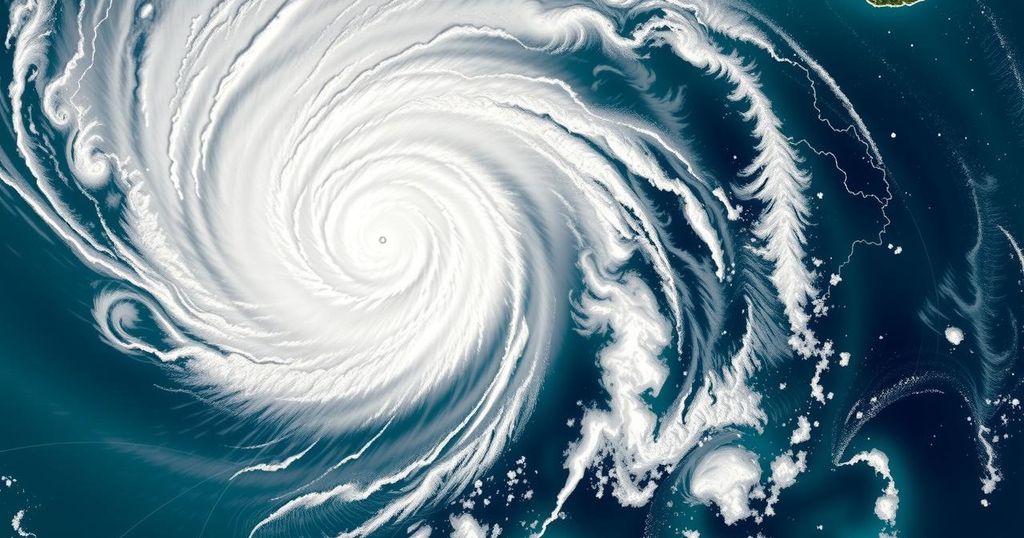Climate change
Global news
AFRICA, ANA CRISTINA, CHI, CHIDO, CLIMATE CHANGE, DIANA, DISASTER MANAGEMENT, EUROPE, FRANCE, FREDERIC LEGUILLIER, INTERIOR MINISTRY, MAYOTTE, MOZAMBIQUE, MOZAMBIQUE NATIONAL METEOROLOGICAL INSTITUTE, NAMPULA, NATIONAL EMERGENCY OPERATIONS CENTER, NATIONAL WEATHER SERVICE, NATURAL DISASTER, NATURAL DISASTERS, PARIS, RAIN, ZIMBABWE
Jamal Walker
0 Comments
Indian Ocean Islands Prepare for Impact of Cyclone Chido
The islands of Comoros, Madagascar, and Mayotte are on high alert for Cyclone Chido, with Comoros closing schools and Madagascar issuing evacuation warnings. Mozambique anticipates over 2 million people will be affected when the cyclone makes landfall. Emergency preparations include evacuation protocols and deployment of aid resources, reflecting concern over the cyclone’s potential devastation due to climate change effects.
The Indian Ocean islands of Comoros, Madagascar, and Mayotte are preparing for the approaching Cyclone Chido, expected to impact the region significantly. As the cyclone approaches, Comoros has closed schools in anticipation of its arrival on Saturday, following its path north of Madagascar. Mayotte has been placed under a red alert by the French weather service, indicating severe weather conditions. Additionally, Mozambique has declared a red alert for its northern provinces, warning that the cyclone could affect over 2 million residents when it reaches the mainland, projected for Sunday.
Madagascar is already taking preventive measures, with government alerts disseminated through broadcasts and mobile messages, urging safety precautions and initiating evacuations in the high-risk northern area of Diana. Authorities estimate that nearly 20,000 individuals may require assistance. Madagascar has deployed food and emergency supplies to these regions, while France is sending additional personnel and emergency resources to Mayotte to provide further aid in anticipation of the storm’s impact.
The cyclone season, extending from December to March, has previously caused widespread devastation in the region. Cyclones Idai and Freddy highlighted the increasing severity of such storms attributed to climate change, with a risk of related natural disasters such as flooding and cholera outbreaks following Cyclone Chido. Crisis24 has warned of potential severe flooding and landslides, posing health risks including cholera, dengue fever, and malaria in the aftermath of Chido’s passage.
Cyclone season in the Indian Ocean, predominantly active from December to March, has historically led to significant human and environmental losses in the region. The impact of climate change has exacerbated the severity and frequency of these storms, manifesting in catastrophic events like Cyclone Idai in 2019, which claimed over 1,300 lives across Mozambique, Malawi, and Zimbabwe, and Cyclone Freddy in the previous year that caused more than 1,000 deaths. Cyclone Chido is the latest storm predicted to follow a destructive path similar to its predecessors, raising concerns over public safety, infrastructure integrity, and potential health crises in the resultant aftermath of flooding and resource scarcity.
In conclusion, Cyclone Chido poses a serious threat to the Indian Ocean islands and the east coast of Africa, with authorities taking significant precautionary measures. The potential impact on over 2 million people in Mozambique exemplifies the cyclone’s expected severity. With historical precedence indicating the growing intensity of such storms due to climate change, the imperative for prompt response and effective disaster management becomes increasingly critical in safeguarding affected populations and mitigating harm.
Original Source: abcnews.go.com




Post Comment